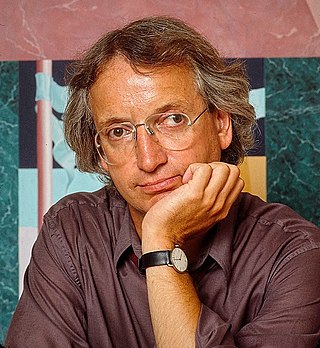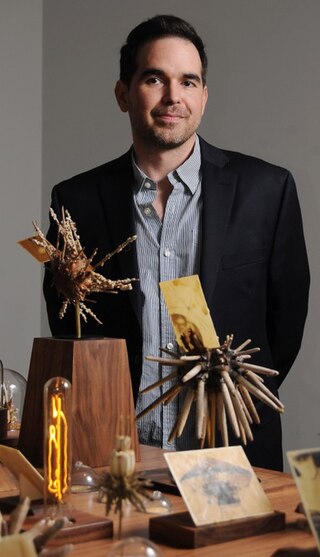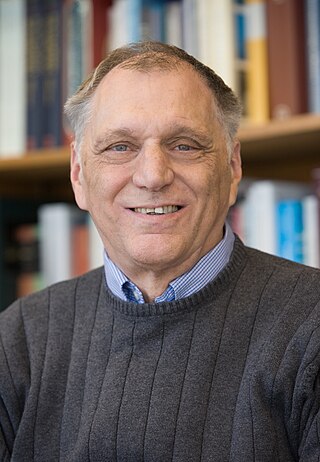
Michael Graves was an American architect, designer, and educator, and principal of Michael Graves and Associates and Michael Graves Design Group. He was a member of The New York Five and the Memphis Group and a professor of architecture at Princeton University for nearly forty years. Following his own partial paralysis in 2003, Graves became an internationally recognized advocate of health care design.

Patricia Smith Churchland is a Canadian-American analytic philosopher noted for her contributions to neurophilosophy and the philosophy of mind. She is UC President's Professor of Philosophy Emerita at the University of California, San Diego (UCSD), where she has taught since 1984. She has also held an adjunct professorship at the Salk Institute for Biological Studies since 1989. She is a member of the Board of Trustees Moscow Center for Consciousness Studies of Philosophy Department, Moscow State University. In 2015, she was elected a Fellow of the American Academy of Arts & Sciences. Educated at the University of British Columbia, the University of Pittsburgh, and Somerville College, Oxford, she taught philosophy at the University of Manitoba from 1969 to 1984 and is married to the philosopher Paul Churchland. Larissa MacFarquhar, writing for The New Yorker, observed of the philosophical couple that: "Their work is so similar that they are sometimes discussed, in journals and books, as one person."
Charles Willard Moore was an American architect, educator, writer, Fellow of the American Institute of Architects, and winner of the AIA Gold Medal in 1991. He is often labeled as the father of postmodernism. His work as an educator was important to a generation of American architects who read his books or studied with him at one of the several universities where he taught.
Terrence Joseph Sejnowski is the Francis Crick Professor at the Salk Institute for Biological Studies where he directs the Computational Neurobiology Laboratory and is the director of the Crick-Jacobs center for theoretical and computational biology. He has performed pioneering research in neural networks and computational neuroscience.

José Rafael Moneo Vallés is a Spanish architect. He won the Pritzker Prize for architecture in 1996, the RIBA Royal Gold Medal in 2003, and La Biennale's Golden Lion in 2021.

James Edward Gunn is the Eugene Higgins Professor of Astronomy at Princeton University. Gunn's early theoretical work in astronomy has helped establish the current understanding of how galaxies form, and the properties of the space between galaxies. He also suggested important observational tests to confirm the presence of dark matter in galaxies, and predicted the existence of a Gunn–Peterson trough in the spectra of distant quasars.

National Institutes of Health Director's Pioneer Award is a research initiative first announced in 2004 designed to support individual scientists' biomedical research. The focus is specifically on "pioneering" research that is highly innovative and has a potential to produce paradigm shifting results. The awards, made annually from the National Institutes of Health common fund, are each worth $500,000 per year, or $2,500,000 for five years.
The Presidential Early Career Award for Scientists and Engineers (PECASE) is the highest honor bestowed by the United States federal government on outstanding scientists and engineers in the early stages of their independent research careers. The White House, following recommendations from participating agencies, confers the awards annually. To be eligible for a Presidential Award, an individual must be a U.S. citizen, national, or permanent resident. Some of the winning scientists and engineers receive up to a five-year research grant.
Tod Williams Billie Tsien Architects is an architectural firm founded in 1986, based in New York. Williams and Tsien began working together in 1977. Their studio focuses on work for institutions including museums, schools, and nonprofit organizations.
The Universities Research Association is a non-profit association of more than 90 research universities, primarily but not exclusively in the United States. It has members also in Japan, Italy, and in the United Kingdom. It was founded in 1965 at the behest of the President's Science Advisory Committee and the National Academy of Sciences to build and operate Fermilab, a National Accelerator Laboratory. Today, the mission of URA is "to establish and operate in the national interest unique laboratories and facilities for research, development, and education in the physical and biological sciences to expand the frontiers of knowledge, foster innovation, and promote the education of future generations of scientists."
The Searle Scholars Program is a career development award made annually to support 15 young faculty in biomedical research and chemistry at US universities and research centers. The goal of the award is to support to exceptional young scientists who are at the beginning of their independent research careers and are working in the fields of medicine, chemistry, and/or biological sciences.

The Princeton University Department of Psychology, located in Peretsman-Scully Hall, is an academic department of Princeton University in Princeton, New Jersey. For over a century, the department has been one of the most notable psychology departments in the country. It has been home to psychologists who have made significant scientific discoveries in psychology and neuroscience, such as adult neurogenesis in primate brains, the concept of the cognitive miser, bystander non-intervention, face-selective neurons in primate brains, feature integration theory, mental models theory, and prospect theory.

Dario Robleto is an American transdisciplinary artist, researcher, writer, and teacher. His research-driven practice results in intricately handcrafted objects that reflect his exploration of music, popular culture, science, war, and American history.

Larry Ryan Squire is an American psychiatrist and neuroscientist. He is a professor of psychiatry, neurosciences, and psychology at the University of California, San Diego, and a Senior Research Career Scientist at the Veterans Affairs Medical Center, San Diego. He is a leading investigator of the neurological bases of memory, which he studies using animal models and human patients with memory impairment.

The Canon: A Whirligig Tour of the Beautiful Basics of Science is a book written by American science author Natalie Angier.

William Samuel Bialek is a theoretical biophysicist and a professor at Princeton University and The Graduate Center, CUNY. Much of his work, which has ranged over a wide variety of theoretical problems at the interface of physics and biology, centers around whether various functions of living beings are optimal, and whether a precise quantification of their performance approaches limits set by basic physical principles. Best known among these is an influential series of studies applying the principles of information theory to the analysis of the neural encoding of information in the nervous system, showing that aspects of brain function can be described as essentially optimal strategies for adapting to the complex dynamics of the world, making the most of the available signals in the face of fundamental physical constraints and limitations.
Roger A. Nicoll is an American neuroscientist at the University of California, San Francisco where he is professor at the Department of Cellular and Molecular Pharmacology.

Fei-Fei Li is a Chinese-American computer scientist, known for establishing ImageNet, the dataset that enabled rapid advances in computer vision in the 2010s. She is the Sequoia Capital professor of computer science at Stanford University and former board director at Twitter. Li is a co-director of the Stanford Institute for Human-Centered Artificial Intelligence and a co-director of the Stanford Vision and Learning Lab. She served as the director of the Stanford Artificial Intelligence Laboratory from 2013 to 2018.

The Princeton Neuroscience Institute (PNI) is a center for neuroscience research at Princeton University. Founded in the spring of 2004, the PNI serves as a "stimulus for teaching and research in neuroscience and related fields" and "places particular emphasis on the close connection between theory, modeling, and experimentation using the most advanced technologies." It often partners with Princeton University's departments of Psychology and Molecular Biology.
David W. Tank is an American molecular biologist and neuroscientist who is the Henry L. Hillman Professor in Molecular Biology at Princeton University.











